Janine Jackson interviewed independent journalist Bryce Covert about Medicaid work requirements for the May 23, 2025, episode of CounterSpin. This is a lightly edited transcript.
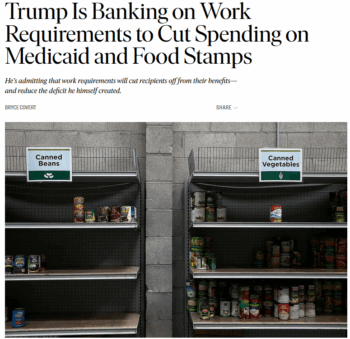
The Nation (2/28/20)
Janine Jackson: Welcome to USA 2025, where the only immigrants deserving welcome are white South Africans, germ theory is just some folks’ opinion, and attaching work requirements to Medicaid and SNAP benefits will make recipients stop being lazy and get a job.
Everything old is not new again, but many things that are old, perverse and discredited are getting dusted off and reintroduced with a vengeance. Our guest has reported the repeatedly offered rationales behind tying work requirements to social benefits, and the real-world impacts of those efforts, for many years now.
Bryce Covert is an independent journalist and a contributing writer at The Nation. She joins us now by phone from Brooklyn. Welcome back to CounterSpin, Bryce Covert.
Bryce Covert: Thank you so much for having me back on.
JJ: Most right-wing, top-down campaigns rely on some element of myth, but this is pretty much all myth: that there’s a problem: Medicaid and also SNAP benefits discourage recipients from seeking work, that this response will increase employment, that it will save the state and federal government money, and that it won’t harm those most in need. It’s layer upon layer of falsehood, that you have spent years breaking down. Where do you even start?
BC: That’s a great place to start, pointing out those claims essentially are all false, and I think it’s important to know, the reason we know that those things are false is because we have years of experience in this country with work requirements in various programs, and they have produced the same results over and over again.
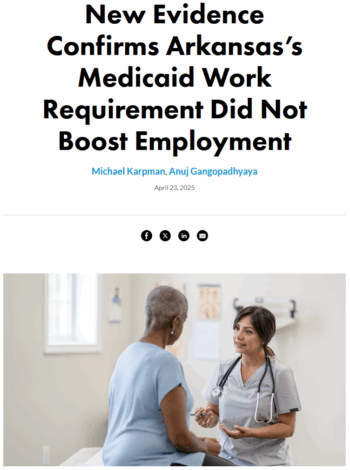
Urban Institute (4/23/25)
So this started, essentially, with welfare, which is now known as Temporary Assistance for Needy Families. In the 1990s, with cash assistance to families, there was a work requirement imposed on recipients in that program that still stands today. And just wave after wave of research has found these requirements did not help increase employment on a long-term basis.
Most people were not actually working after they were subjected to the work requirement, and instead it increased poverty. It reduced the recipients of these benefits. So it essentially didn’t help them get to work, but it did take away the money that they were relying on.
That pattern plays out over and over again, and we have some newer evidence in Medicaid because, up until the first Trump administration, states could not impose a work requirement in Medicaid. The Trump administration allowed waivers to do so. Only one state actually did it. But Arkansas, the state that did impose this work requirement, kicked over 18,000 people off the program with no discernible impact on employment.
JJ: And it has to do with a misunderstanding about who Medicaid recipients are, and their relationship to the workplace, period, right?
BC: Right. Most Medicaid recipients are either working, or have some good reasons for why they’re not working. Either they can’t find full-time work, or they have conflicts, like they’re taking care of family members.
People are disabled, many of them have an official disability and they’re on the actual disability program, but many more are disabled and can’t get on that program. It is a very difficult program to enroll in. The burdens to enrollment are super, super high. And others say it’s because they are in school, or they’re trying to find work, or they’re retired.
So among those who aren’t working, there’s not a lot who are in any good position to go out and start working. And that’s true of a lot of recipients of other public benefits as well. So when you talk about imposing a work requirement on people in Medicaid, what you’re doing is adding administrative burden, which is to say extra steps they have to take to keep getting their benefits, that aren’t going to actually change the situation they’re facing when it comes to their employment.
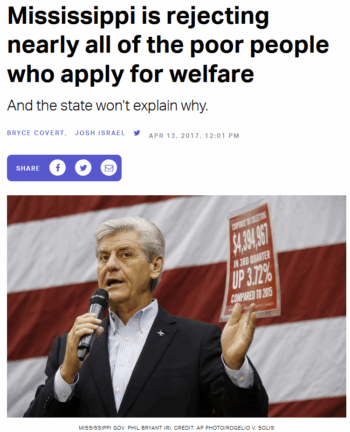
Think Progress (4/13/17)
JJ: When you wrote about Mississippi, I know, with TANF, you were saying you had to prove you had a job, or were searching for one, before you could get help with childcare. And if people would just take a second and think, how do you search for a job or hold a job without childcare? So it’s not even logical. It’s more a kind of moral, strange misunderstanding of why people are outside of the workforce.
BC: I think this applies to other programs, too. It’s hard to get to work if you don’t have health insurance like Medicaid to get yourself healthy and in a good working position. If you’re not able to get food stamps and buy food for yourself, it’s going to be hard to be out there looking for a job.
These are basic necessities, and I think that’s another really important point to make here, is that Republicans have tried to paint lots of different programs as “welfare,” because that word is very stigmatizing. But what we’re talking about with Medicaid is healthcare. We are talking about feeling as if we need to force people to work—although really what we’re doing is forcing them to document on some pieces of paper that they’re working, which is an important distinction—in order to get healthcare, in order to take care of their bodies and be healthy.
Same with food stamps. We’re saying “you must work in order to eat.” These are basic, basic necessities that people need simply to survive.
JJ: And then we hear about the “dignity” of work. You need to work because there’s dignity there, and yet somehow a person whose grandfather owned the steel mill doesn’t need that dignity. Wealthy people who don’t work somehow are outside of this moral conversation.
BC: Yeah, and we’re talking about imposing work requirements on SNAP and Medicaid, which is what Republicans say they want to do, in the service of tax cuts for the wealthy. Essentially, they are literally paying for tax cuts for the wealthy, to return more money to the rich, by cutting programs for the poor. And those rich people, many of them do not work, or these tax breaks help them to avoid work—the inheritance tax, for example. So that moral obligation to work does not apply.
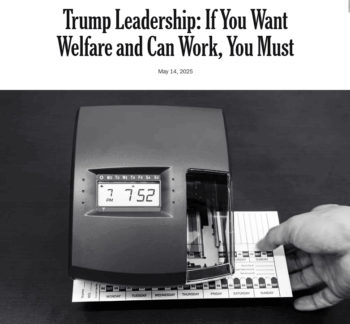
New York Times (5/14/25)
JJ: The New York Times column recently, from four Trump officials—I don’t remember the headline, but it was something like, “If You Can Work, You Must.” They didn’t marshal any evidence. They didn’t have data, just vibes. Those are some racist, racist vibes, aren’t they?
BC: Yes. That is an important point, that all of this cannot be separated out from racism.
I mean, the conversation over welfare and TANF in the 1990s, that was all race. It was about white Americans feeling like Black Americans were getting the dole, and were too lazy to work and had to be forced to work. The numbers at the time did not bear that out. More white Americans were getting cash assistance than Black ones.
But it’s a really deep-seated belief among Americans, and I think when you see, as in that op-ed, for example, or other places where Republicans are trying to call these other programs “welfare,” it’s barely even just a dog whistle. It is pretty blatant that they are trying to paint other programs as things that help Black people who are too lazy to work.
It’s all caught up in that idea, even though, again, the numbers do not bear this out. White people are more likely to be on these programs. We see equal employment rates among both populations. This is not actually a problem to solve for, but it is one I think a lot of Americans, unfortunately, really believe.
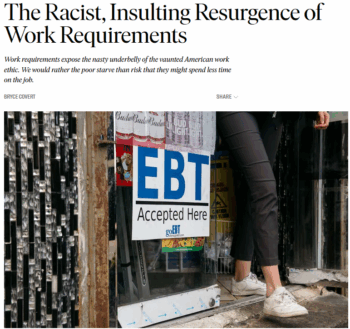
The Nation (6/8/23)
JJ: I’m going to ask you about media in another second. I just wanted to pull up another point about the racism, which is that it’s not just the mythologizing and the “welfare queen,” that those of us who are old enough will remember. But you wrote about how states with larger Black populations have stricter rules, and how when states were asked for exemptions on pushing these work requirements, they exempted majority white counties. So it’s not just the racism in the rationale, the racism in how it plays out is there too?
BC: Absolutely. I mean, these policies hit Black people more heavily. They are more stringently applied in Southern states that have higher Black populations, that are more hostile to their Black populations. And like you said, in the first Trump administration, when states were seeking exemptions, it was more majority white populations who got them. This is just really a fundamental racist myth we have in this country that’s proven very hard to shake, that Black people are lazy and rely on the government to get by and must be forced to work, when just nothing about the actual numbers and data bears that out.
JJ: I sometimes feel like reporters, even if they’re well-intentioned and trying to make it personal, they can kind of make it a thought experiment for folks who are better off. If you were struggling, wouldn’t you take the time to fill out a form? It’s just paperwork. Couldn’t you go across town to the office and fill out that form? And it just represents a total disconnect, experiential disconnect between anyone who has ever had to deal with this and those who have no idea about it at all and just kind of parachute in and say, Oh wow, filling out a form. What’s the big deal?

Bryce Covert: “This is not about, in fact, helping people to work. This is, instead, about kicking people off the program.”
BC: Yeah, I think most well-off Americans have no idea how hard it is to apply for these programs, to stay on these programs, the paperwork that’s involved, the time that’s involved. And also when we’ve seen work requirements in Medicaid, for example, they are set up in a very complex way. Arkansas’s website was only available during the working day, and then it would shut down, and you couldn’t log your work requirement hours at night. I think that belies the fact that this is not about, in fact, helping people to work. This is, instead, about kicking people off the program.
You can see that in the fact that the reason Republicans are talking about work requirements right now is because they need to find spending savings to pay for the tax cuts. If this were not about kicking people off and spending less on benefits, then this wouldn’t be part of this current conversation about their “One Big, Beautiful Bill.” So these are huge administrative burdens, and it’s also a big burden for something that is a deep necessity. I think the mental impact, the emotional impact of being made to jump through these huge hoops for something as basic as food, it’s really extreme.
For example, I recently had to go to the DMV to get my Real ID. I had to go to the office in person. I had to wait for hours. I had to bring all the right paperwork. It was a huge burden, but this was for something that would just make it a little easier to travel on an airplane.
Think about going through the same process, having to show up somewhere in person, waiting for hours, making sure you have all the right documentation, and if you don’t, then you don’t get the thing that you’re seeking, but what we’re talking about is whether or not you get healthcare. What we’re talking about is whether you get food stamps. I think it’s an experience that’s hard for people who haven’t gone through it to grasp.
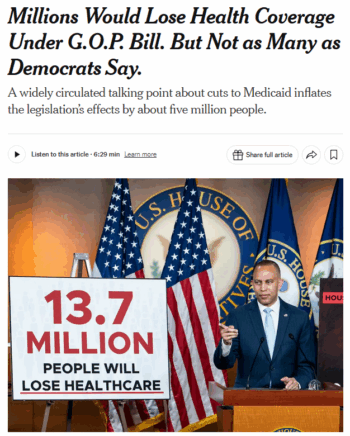
New York Times (5/13/25)
JJ: To bring it back to today, May 21, some coverage that I’m reading straight up says some 8.6 million people are going to find themselves uninsured. Other stories matter-of-factly describe work requirements, and some Republicans’ anger that they’re not going to kick in sooner, as about “offsetting” the tax cuts for the wealthy, as though we’re just kind of recalibrating, and this is going to balance things in a natural way.
I guess I would say I’m not getting the energy that there are 14 million children who rely on both Medicaid and SNAP, and there’s children who could lose healthcare and food at the same time, and that includes 20% of all children under the age of five. From news media, I’m getting Republicans versus Democrats; I’m not so much getting children versus hunger.
BC: Yeah, I think, unfortunately, these kinds of political debates tend to be covered like they are just political back and forth. Democrats think this, Republicans think that. It is legitimately harder to explain to people what this will mean in real life. I have reported on the impact of work requirements. For example, I went to Arkansas when they were in effect. It’s hard to report on. The people who are impacted are vulnerable. They have chaotic lives. They may not even know that they are subject to it.
Unfortunately, I think it’s likely that if this passes and these cuts are implemented, we will see more stories about what happens, because it will be a little easier to say concretely, “This kid right here doesn’t get food or healthcare anymore.” But it would be nice to have that conveyed ahead of time, so the public understood what was happening before it went into effect.
JJ: We’ve been speaking with independent reporter Bryce Covert. You can find her work online at BryceCovert.com. Bryce Covert, thank you so much for joining us this week on CounterSpin.
BC: Yeah, thank you for having me.
This content originally appeared on FAIR and was authored by Janine Jackson.